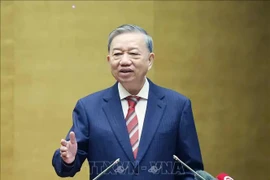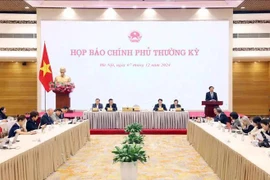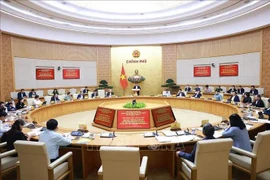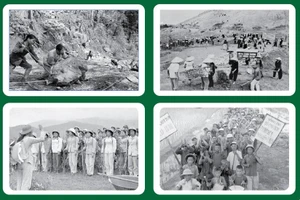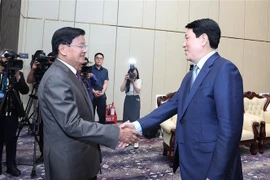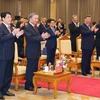Hanoi (VNA) - Prime Minister Pham Minh Chinh on December 12 highlighted the need to counteract group interests and personal gains during the restructuring process of the organisational apparatus, and develop appropriate policies to safeguard officials and public servants’ legitimate rights and interests.
He made the requirement while chairing the second meeting of the Government steering committee to review the implementation of Resolution No. 18-NQ/TW, adopted by the 12th Party Central Committee in 2017, regarding several issues on continuing to restructure and streamline the political system for greater efficiency.
According to the steering committee, in response to a request by the Central Steering Committee on the review of Resolution 18-NQ/TW, the Government, ministries, ministerial-level agencies, and government-affiliated agencies have quickly implemented the restructuring of the political system to make it more streamlined, effective, and efficient. To date, they have basically completed their restructuring plans.
The steering committee has issued a plan to guide the streamlining and restructuring of the Government’s organisational apparatus, under which eight ministries and ministerial-level agencies will be maintained, while 14 others will be merged or reorganised. After the restructuring, there will be 13 ministries and four ministerial-level agencies (a reduction of five ministries), along with four government-affiliated agencies (a reduction of four agencies). Additionally, at the ministries, and ministerial-level and government-affiliated agencies, there will be a reduction of at least 15%-20% in the number of internal organisational units.
At the meeting, the steering committee reviewed a proposal from the Government’s Party Civil Affairs Committee regarding the drafting of a decree on regimes and policies for officials, civil servants, and public employees in the restructuring; the management of public finance and assets, and public investment projects; as well as the restructuring of state-owned enterprises. Based on this, it will finalise the draft decree which will be presented to the Politburo and the Central Steering Committee.
Concluding the event, PM Chinh assigned the Ministry of Home Affairs, the standing agency of the steering committee, to collect the feedback and coordinate with relevant agencies to continue refining the documents for submission to the steering committee.
He said the outcomes of this session should be sent to ministries, sectors, and agencies to serve as a basis for further completing their proposals under the guidance of the Deputy Prime Ministers assigned to oversee the process.
With the spirit of "clear thinking, high determination, great effort, and decisive action; and addressing each task thoroughly," the Government leader called on ministries, sectors, and agencies to uphold their responsibilities, put the nation and people's interests above all, and implement the organisational apparatus restructuring in a manner that suits Vietnam's circumstances and conditions, while drawing on international experience.
The restructuring must aim for a streamlined apparatus that is still effective and efficient. Functions and duties should not be eliminated; instead, additional responsibilities may be assigned to organisations, Chinh said, stressing the importance of enhancing the application of digital transformation in state management to avoid "ask-give" mechanisms and combat petty corruption.
For state-owned groups and corporations, the PM directed the classification of enterprises and the development of restructuring plans to ensure state management while enhancing the operational efficiency of these enterprises. Concurrently, he emphasised the need to continue perfecting relevant laws to ensure proper decentralisation and delegation of authority, and grant greater responsibility to the businesses themselves./.

See more
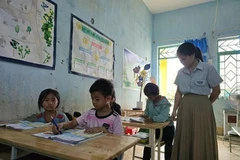
Amendments proposed to ease nationality procedures for foreigners, OVs
The draft law on amendments to the Law on Vietnamese Nationality features the revision of some regulations related to nationality acquisition, making it easier for individuals with Vietnamese parents or grandparents, as well as foreign investors, scientists and experts, to gain Vietnamese citizenship.
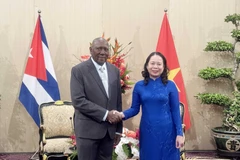
Cuba – a leading important, trusted partner of Vietnam: Vice President
Vice President Vo Thi Anh Xuan stressed that the Vietnamese people always treasure the sincere solidarity and invaluable support that the Cuban Party, State, and people have provided for Vietnam throughout nearly seven decades.
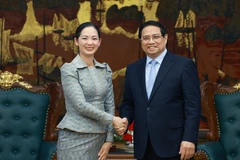
PM welcomes Cambodian Minister of Commerce
PM Pham Minh Chinh praised the signing of the agreement to promote bilateral trade between the Governments of Vietnam and Cambodia for the 2025–2026 period, noting that it will provide legal grounds for reaching the trade target of 20 billion USD.
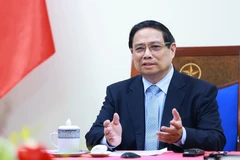
Vietnamese, Malaysian PMs hold phone talks
PM Pham Minh Chinh reaffirmed Vietnam’s commitment to being an active and responsible ASEAN member, pledging continued support for Malaysia during its ASEAN chairmanship and for the successful organisation of upcoming ASEAN conferences.
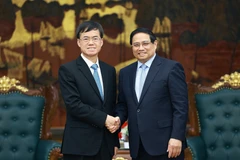
PM receives Chinese Minister of Veterans Affairs
PM Pham Minh Chinh said he hopes that the Chinese Ministry of Veterans Affairs will bolster cooperation with Vietnamese agencies to raise public awareness of the traditional friendship between the two countries.
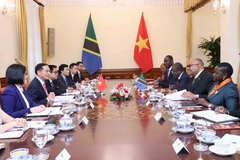
Vietnam, Tanzania uphold political trust to usher in new cooperation phase
Deputy Prime Minister and Minister of Foreign Affairs Bui Thanh Son held talks with Tanzanian Minister of Foreign Affairs and East African Cooperation Mahmoud Thabit Kombo in Hanoi on April 28.
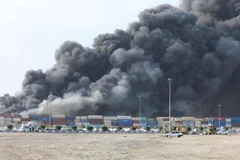
State President extends condolences over explosion in Iran
State President Luong Cuong on April 28 sent a message of condolences to Iranian President Masoud Pezeshkian following a tragic explosion at Shahid Rajaee Port in Hormozgan province on April 26.
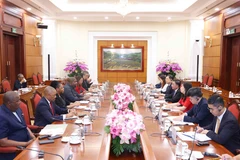
Officials of Vietnamese, Mozambican parties hold talks
The officials underscored the importance of preserving and fostering the relationship between the two ruling parties to guide and promote the countries’ multi-faceted cooperation, ensuring it grows deeper and delivers substantive results.
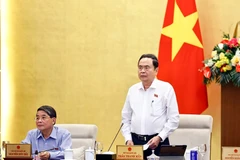
NA Standing Committee’s 44th session wraps up
National Assembly Chairman Tran Thanh Man stressed the need for continued urgency and diligence in preparing the remaining items, particularly contentious draft laws, to ensure complete documentation.
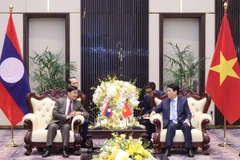
Vung Ang port’s wharf No.3 – symbol of Vietnam-Laos friendship: State President
State President Luong Cuong described the inauguration wharf No.3 at Vung Ang port in the central province of Ha Tinh as a significant political and diplomatic milestone, demonstrating the two countries’ determination to strengthen connectivity and promote their development cooperation.
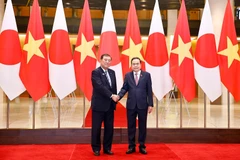
Top Vietnamese legislator, Japanese PM laud substantive development of bilateral ties
Vietnam considers Japan as one of the leading and long-term partners, NA Chairman Tran Thanh Man said, proposing strengthened cooperation in the four priority areas of economy, human resources development, people-to-people exchanges, and locality-to-locality collaboration.
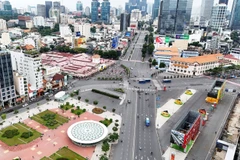
Japanese expert lauds Vietnam’s art of bamboo diplomacy
Senior research fellow at Meiji University Prof. Go Ito delved into Vietnam's remarkable journey over the past five decades since the liberation of the South and national reunification in an analysis published by the Japan Forum on International Relations on April 28, crediting its adaptability and a distinctive diplomatic approach dubbed “bamboo diplomacy.”
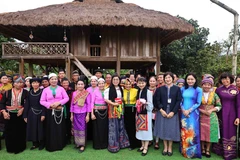
Spouses of Vietnamese, Japanese PMs explore Vietnam’s ethnic heritage
Madame Le Thi Bich Tran, spouse of Vietnamese Prime Minister Pham Minh Chinh, and Madame Ishiba Yoshiko, spouse of Japanese Prime Minister Ishiba Shigeru, toured the Vietnam National Village for Ethnic Culture and Tourism which showcases Vietnam’s ethnic cultural diversity.

☕ Afternoon briefing on April 28
The following is a brief review of the day’s events as reported by the Vietnam News Agency.
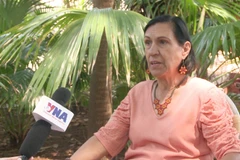
Vietnam’s April 30 victory a common joy of justice seekers: Cuban scholar
The victory on April 30, 1975 was not only a triumph for the Vietnamese people but also a reflection of the patriotic spirit that defines the nation.
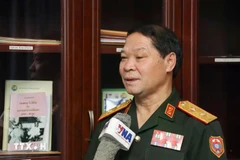
April 30 victory is a great triumph of both Laos and Vietnam: military officer
Under the brilliant leadership and guidance of the Communist Party of Vietnam (CPV), the Vietnamese army and people, especially those in the South, succeeded in their struggle against the imperialist forces. This historic victory helped Vietnam gain national reunification, enabling the country to safeguard its sovereignty and advance steadily on the path of socialism for the great goal of building a prosperous Vietnam as today.
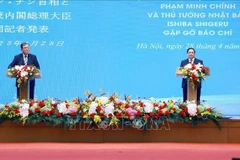
Vietnam, Japan issue joint communiqué
Vietnamese and Japanese Prime Ministers expressed their delight at the strong, comprehensive and substantive development of the Vietnam - Japan Comprehensive Strategic Partnership for Peace and Prosperity in Asia and the World after more than one year of upgrading, affirming that they will closely coordinate and further strengthen the Vietnam - Japan cooperation towards a new era of Vietnam.
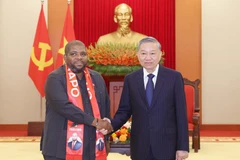
Top Vietnamese leader receives Secretary General of FRELIMO Party
The General Secretary emphasised that the participation of the FRELIMO Party, along with friendly and fraternal parties from Africa as well as from many regions around the world, is a great joy, support and encouragement for the Party, State and people of Vietnam in these meaningful days.
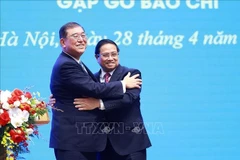
Vietnamese, Japanese PMs conduct productive talks in Hanoi
Vietnamese and Japanese PM agreed to deepen economic, investment, and trade cooperation, particularly through promoting new-generation ODA for strategic infrastructure projects and fast-tracking symbolic joint ventures.
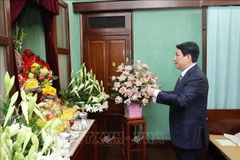
State leader pays tribute to late President Ho Chi Minh
In a solemn, emotional atmosphere, President Cuong pledged to continue striving, together with the entire Party and people, to uphold the strength of great national unity and the aspiration for development, advancing the nation into a new era of prosperity and growth.
